Catawba County, NC
Click here to see an interactive map with pinpoints on many of the places discussed here.
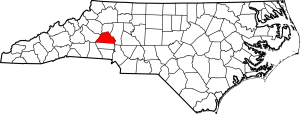
When I began researching my family, I had a very stationary view of my family. “We’ve been here for generations,” I told people. By “here,” I meant Catawba County, North Carolina.
Catawba County was founded in 1842 from the neighboring Lincoln County, but Lutheran German farmers originally settled the land in the 1700s. The county seat was named Newton, my hometown.
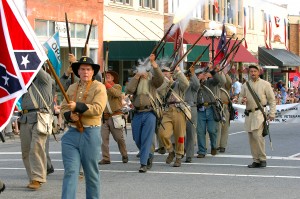
In 1889, Newton began the Old Soldiers’ Reunion celebration, which began as a gathering of Civil War veterans who came to town to receive their pensions. Now, it is believed to be the longest running parade of its kind (patriotic, not based on a holiday) in the nation. I have fond memories of the parade from my childhood – setting out chairs the night before to get good spots, sitting on the curb and watching the elaborate floats go by, dripping melted chocolate ice cream on my shirt and scrambling for gun shells discarded by the Civil War period rifles features in the parade.
The county was popular in the early 1900s for its multiple gold mines, which were incredibly profitable. In elementary school, we took a field trip to one of the gold and gem mines still in operation in the county – I found a small amethyst on a rock the size of my fist, and I still have it.
Catawba County and the town of Hickory received national attention in 1944 for the “Miracle of Hickory,” when community volunteers came together and assembled an emergency polio hospital in only 54 hours.
Later, between 1959 and 1964, Duke Energy constructed a dam that created what is now Lake Norman. If I had a dollar for every summer day that I spent diving in that lake!
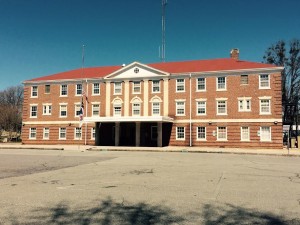
As far I was concerned, my roots in Catawba County went deep. My grandparents Frank and Shirley met in the old hospital when they both worked there, married, and later had their children in the same hospital.
My father was born only a few streets away from where he grew up on the same street as his grandparents. He went to Newton-Conover High School, played football wearing #65 for their varsity team, and has lived in Newton his entire life.
My parents met in Newton and later married in Grace Reformed United Church of Christ, and my first home was on the same block as my Callahan grandparents and great-grandfather Earl.
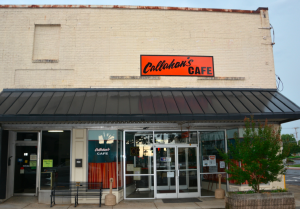
My great-uncle Roy owns a popular diner on the Newton town square, and I can hardly go anywhere in Newton or Conover without people knowing I’m a Callahan. I even worked at the same pool my father swam in as a child!
However, only days into my research, I realized that the exact opposite was true of my Callahan family. To my surprise, my father and his sister were the first Callahans to be born in Catawba County – my grandfather Frank and his family were actually from high in the mountains in Mitchell County! My grandfather didn’t even move to Newton until the 1950s, only a decade before my father was born.
This was strangely disappointing, and it felt rather like having the rug pulled out from under my feet. If I was wrong about this, what else was I wrong about? More importantly, if I didn’t have roots in Catawba County, where did I have them? Catawba was my home, where I had spent my entire life, and I had always thought that was the one place that my family knew.
I had to come to terms with the fact that just because my family hadn’t been in Catawba for very long, the impact they had made in the county and the intense feeling of “home” that I felt weren’t discounted.
Once I had realized this, it was all the more gratifying to realize that my Abernethy relatives, who I never knew because of my grandmother Shirley’s early death, had been there for generations, and they were all around me.
My 5th-great-grandfather Charles Abernethy moved to what was then Lincoln County in the late 1700s. The Abernethys have been there ever since.
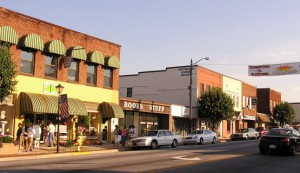
My grandmother Shirley was born in Conover to Carl, who was also born there, and Parvell, who had lived there since she was a girl. Her childhood home was on a corner I drove by every day last summer going to visit my cousins across town.
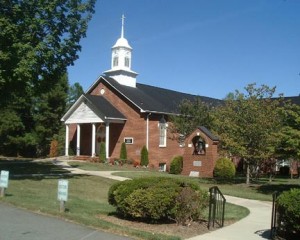
Parvell’s parents and grandparents were buried in the Friendship United Methodist Church cemetery, which I drove by every school day for nearly ten years on my way to elementary, middle, and high school.
On that same route was a small little white building, which now houses a Lions’ Club, where the Abernethys used to hold their family reunions in the first week of May. My father can remember going with his mother before she died, but I never knew.

Out near my high school is the Mount Ruhama Baptist Church. Its cemetery is the eternal resting place of generations of Abernethys.
One of the most gratifying things about my research over the past semester was learning that I did have roots in Catawba County, even if they weren’t in the places I though. While “home” is very much an emotional connection, more so that physical presence, the physical and historical connection that I have with Catawba County has only strengthen the emotional ties I have there.